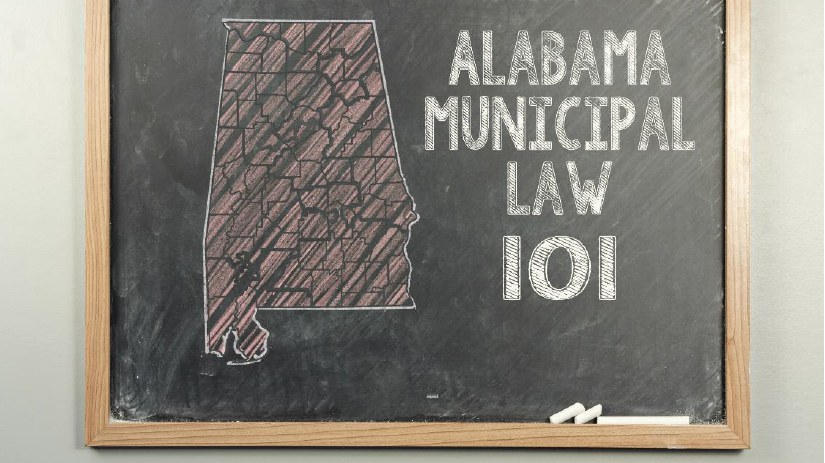Alabama Municipal Law 101 (a Primer on the Basics)
| Publication year | 2021 |
| Pages | 0244 |
By Lorelei A. Lein, Teneé R.J. Frazier, and H. Robert Johnston

Alabama has 463 incorporated municipalities located in 67 counties. These entities are designated by state law as either cities (population of more than 2,000) or towns (population of fewer than 2,000) and range in size from the state's largest city, Birmingham (population 212,247) to the town of McMullen (population 10). Alabama is predominantly a state of small municipalities; more than 60 percent have a population of fewer than 2,000, and 27 percent have a population of fewer than 500.
Mayor-Council Government
Most Alabama cities and towns use the mayor-council form of government. This form is provided for by Ala. Code §§ 11-43-1 to - 232. There are two variations of the mayor-council form of government. In cities with 12,000 or more inhabitants, the governing body is generally composed of a mayor and five councilmembers, and in a handful of municipalities, seven or nine councilmembers. These officials are elected by the voters of the city or town at-large unless the council, at least six months prior to an election, has voted to elect the councilmembers from districts or is otherwise required by law to be districted.
In municipalities with fewer than 12,000 in population, the legislative functions are exercised by the council which is generally composed of the mayor and five councilmembers. Section 11-43-63 permits up to seven councilmembers in municipalities which are districted. The mayor presides over all deliberations of the council. At the mayor's discretion, the mayor may vote as a member of the council on any issue coming to a vote. In the case of a tie vote, the mayor must vote. § 11-43-2. The mayor, however, may never vote more than once on any issue that comes before the council, even in the case of a tie vote. Jones v. Coosada, 356 So. 2d 168 (Ala. 1978). All of the legislative powers of the municipality are exercised by the council acting as a whole.
Council-Manager Government
Any Alabama municipality can hire a city manager as provided for in § 11-43-20 to -22. However, that a city has a manager hired under the provisions of this statute does not by itself give the municipality a true council-manager form of government. To deal with this, the legislature adopted the Council-Manager Act of 1982, §§ 11-43A-1 to -52, to allow all Class 2 through Class 8 municipalities the option of becoming a true council-manager form of government.
The council is the governing body of a municipality organized under the council-manager form of government, and it is composed of five or seven members. One member shall be the mayor who is elected at large, who shall be a voting member of the council, and either four or six members shall be council members elected either at large or from single-member districts, as the resolution shall provide. § 11-43 A-1.1. If a municipality has single-member districts for the election of council members when the council-manager form of government is adopted in the municipality, the municipality must continue with either four or six council members elected from single-member districts, and the mayor shall be elected at large. The mayor is the presiding officer of the council and may vote on any issue coming before that body. § 11-43A-8.
The council has the power to appoint and remove a city manager and establish other administrative departments and distribute the work of such departments. § 11-43A-17. According to the Act, the city manager is the chief executive and head of the administrative branch of the municipal government and is responsible to the council for the proper administration of all affairs of the municipality. § 11-43A-28. Currently, Auburn, Tuskegee, and Vestavia Hills operate under this form of government.
Other Forms of Municipal Government
The Alabama legislature has adopted specific legislation to provide either a form of government for a particular municipality or to provide a procedure by which the form of government of certain municipalities may be altered. These laws generally apply only to a single city or town. Those municipalities affected by specific enactments are:
• Anniston-Council-Manager, Act No. 71-1049...
• Phenix City-Council-Manager, Act No. 77-71
• Montgomery-Mayor-Council, Act No. 73-618
• Birmingham-Mayor-Council, Act No. 55-452
• Troy-Mayor-Council, §§ 11-44A-1 to -16
• Opelika-Mayor-Council, §§ 11-44D-1 to -21
• Prichard-Mayor-Council, §§ 11-43C-1 to -92
• Tuscaloosa-Mayor-Council, §§ 11-44B-1 to -22
• Bessemer-Mayor-Council, §§ 11-43D-1 to -22
• Gadsden-Mayor-Council, §§ 11-43B-1 to -32
• Mobile-Mayor-Council, Ala. §§ 11-44C-1 to -93
• Dothan-Class 5 cities with a mayor-commission-manager,
To continue reading
Request your trial
